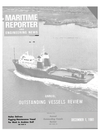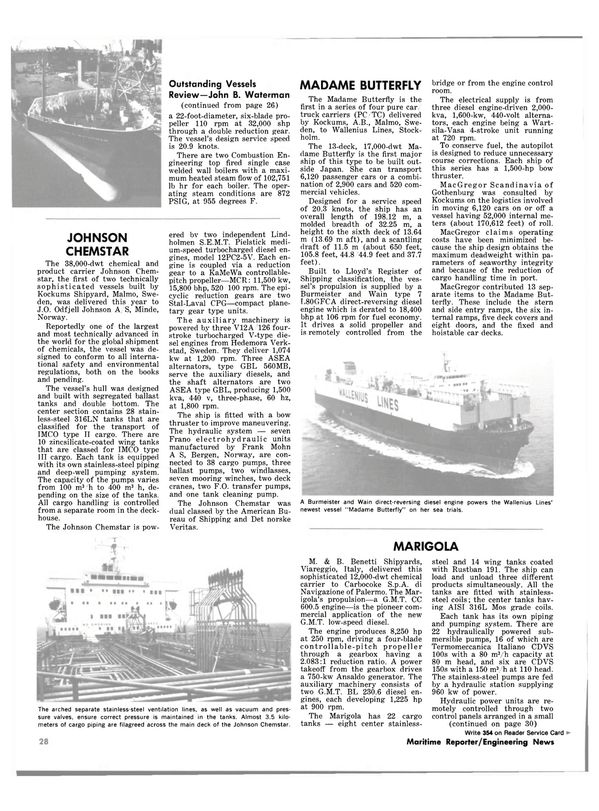
ASNE Flagship Section Hears Paper On Engineering Costs And Risks
The second meeting for the 1981 82 season of the Flagship Section of The American Society of Naval Engineers had a unique format. It was held at a location close to the working place of many members, the Crystal City Marriott, which was also near a metro subway stop for the convenience of other members, and at a convenient time — immediately after normal working hours.
The meeting consisted of a cocktail hour and technical session only, enabling the participants to be on their way or free to attend other activities by 7:30 p.m. The technical session entailed examination of the "Costs and Risks of Engineering Progress— An Update," a topic first broached by Adm. Nathan Sonenshein some 22 years ago, when he was a captain in the Bureau of Ships.
The a u t h o r s , Comdr. Clark Graham. Lt. Comdrs. James Baskerville and Michael Reed, and Jan Hope used the common parameters of "Goal," "Risk," "Application," "Performance," "Evaluation," "Correction," and "Lessons Learned," to examine six major programs conducted by NAVSEA in the last two decades.
These programs, "Waste Heat Boiler," "Pressure Fired Boiler," "Digital Combat System," "AO 177 Highly Skewed Propeller," "Drone Antisubmarine Helicopter (DASH)," and the "Marine Gas Turbine" were analyzed as to how they contributed to engineering progress.
The conclusion reached was that while not all programs will be highly successful nor even slightly successful, to obtain any success at all, a bold engineering outlook taking into consideration past experience and the acceptance of calculated risks must be the approach taken by NAVSEA in the future.
Read ASNE Flagship Section Hears Paper On Engineering Costs And Risks in Pdf, Flash or Html5 edition of December 1981 Maritime Reporter
Other stories from December 1981 issue
Content
- MarAd Approves Farrell Lines Ship Charter To Military Sealift Command page: 4
- 83 Vessel $3.4-Billion Program Planned By Japanese Shippers page: 4
- Veliotis Takes New Post With General Dynamics page: 4
- Petroterminal De Panama Selects EMH To Construct Tanker-Loading Buoys page: 6
- Name Peter West VP Of Transway Operations page: 6
- Sun Company, Levingston Sign Letter Of Intent For Pa. Shipyard Sale page: 6
- American Steamship Names D. Ward Fuller As Its Chief Operating Officer page: 6
- SNAME-Hampton Roads Hears Paper On Fuel Savings In Cargo Heating Systems page: 10
- Multipurpose Semisubmersible Built To Handle North Sea Emergencies page: 10
- Maher Expands Container Facility, To Install First Paceco Transtainers In N.Y. page: 15
- Kvaerner, Oy Navire To Merge Shipbuilding, Equipment Capabilities page: 15
- Baldt Inc. Develops New Abrasion-Resistant Chain —Brochure Available page: 15
- Kaiser Engineers Awarded Service Contract For Trident Sub Facilities page: 16
- SNAME Philadelphia Section Discusses Ship Design By Personal Computers page: 18
- M/V Europa Completes Sea Trials; Luxury Cruise Liner Filled With Many Environmental Safeguards page: 18
- Gulf Oil Announces Exec Assignments For Corporation And Divisions page: 18
- Award RCA $339 Million In Contracts For Navy's Aegis Weapon Systems page: 19
- Three Top Management Changes At Levingston page: 20
- Outstanding Vessels page: 22
- Largest U.S.-Built Hopper Dredge Launched At Avondale Shipyards page: 22
- ASNE Flagship Section Hears Paper On Engineering Costs And Risks page: 22
- DredgeMasters To Acquire Aquamarine Corporation page: 24
- Advanced Marine To Design New Ferryboat page: 24
- Newfoundland's Ocean Cargo Services Seen Expanding With Coming Offshore Oil Boom page: 24
- Soviets Plan Nuclear Powered Merchant Ship, To Be Completed By 1984 page: 25
- Spanish Shipbuilders Assoc. Publishes New Brochure —Copies Available page: 26
- Name John Malagraph General Manager Of Advanced Marine In N.Y. page: 26
- Shell To Provide Bunkering Service At Port Of Mobile —Literature Available page: 27
- Appoint Hession President Of Koehring Clyde, Whirley Crane Producer page: 27
- Name Parks President Of Farrell Lines page: 27
- Todd-Seattle Sponsors Marine Diesel Seminar page: 28
- Norcontrol To Install $3-Million Vessel Traffic System —Literature Available page: 28
- SNAME page: 36
- Moss Rosenberg Verft Develops Energy-Saving LNG Carrier page: 41
- $2.1-Million Title XI Guarantee For Tanker IGS And COW Retrofit page: 41
- SNAME New York Hears Paper On Marine Gas Chemists page: 42
- Utility Vessel M/V Lamnalco Mallard Delivered To Kuwait Service By HUDSHIP page: 42
- SNAME-New England, ASNE Hear Rear Adm. Beecher On Battleship Reactivation page: 42
- Allis-Chalmers Receives $6-Million M u d Pump Order From Wilson page: 43
- $1 -Billion Lube Oil Refinery To Be Constructed In Saudi Arabia page: 43
- Deliver 13th Supply Boat To Marsea Agencies Fleet, Plan Eight More For 1982 page: 48
- Paducah Marine Ways To Add Fab & Prop Shops page: 48
- Brown & Root Affiliate Awarded Pipeline Contract In Danish North Sea Area page: 50
- Maritime Safety Group Honors 12 Persons For Technical Presentations page: 50
- Award $12-Million Contract To Uniflite For Boats Used By Navy's Special Forces page: 53
- Hold Dedication And Ribbon-Cutting Ceremony At New Bell Halter Yard page: 53
- SNAME's Great Lakes And Rivers Section Meets At Universty Of Michigan page: 56
- Canadian Shipbuilders Group Sets Date For 1982 Conference page: 56
- Sperry Introduces New Ship Control System —Literature Available page: 57
- St. Louis Ship Announces Management Appointments At Engine Repair Division page: 58
- New Brochure Describes Allied Water/SweetWater R/O Water Maker page: 58
- Papers On Containerships, Bulkers Presented By SNAME California Sections page: 60
- Submarine LNG Carrier Proposed By General Dynamics For Arctic Regions page: 60
- Joseph Lykes To Retire As Head Of Lykes Steamship; James Amoss To Be CEO page: 69
- Student Papers Meeting Held By SNAME New England Section page: 69
- Coast Guard Proposes Maneuvering Standards For U.S.-Flag Vessels page: 70
- MSC Accepts Third Sea-Land Containership page: 70
- Commission Destroyer USS Scott Third Ship In A New Class page: 81
- Nuclear Attack Submarine La Jolla Commissioned At New London page: 81
- Bergeron Delivers 160-Foot Tank Barge Tide Mar 34 To Tidewater Marine page: 87
- Kings Craft Delivers Matmar Drill III, Third Of Four Crewboats From Yard page: 87


